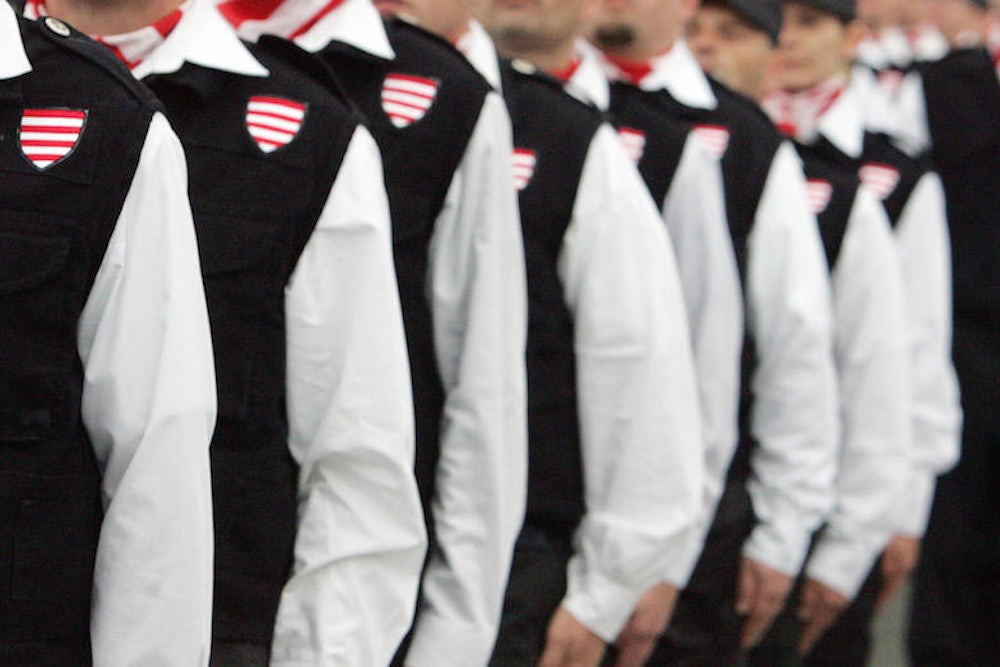Since the beginning of the Ukraine crisis, Russian President Vladimir Putin has accused the authorities in Kiev of being “Fascists” and “neo-Nazis”. Moscow’s foreign minister, Sergei Lavrov, recently condemned the European Union for rising racist tendencies among its member states. In reality, it is Russia, and not Ukraine or the EU, that is nurturing extremist sentiments. It is to Moscow that Europe’s far-right is flocking.
Across Europe, far-right parties are dancing to Putin’s tune. After March’s farcical referendum in Crimea—“international monitors” for which were primarily drawn from a shady Russia-backed organisation led by a Belgian neo-Nazi—a delegation of extremist and populist members of Germany’s far-right Neue Rechte movement visited the peninsula and praised the election as a model for Europe. Bulgaria’s neo-Nazi Ataka party has called on its government to “recognize” Crimea’s absorption into Russia. A spokesman for Marine Le Pen, leader of France’s National Front, defended the Kremlin’s annexation of Crimea by arguing that “historically, Crimea is part of Mother Russia.”
With his intervention in Crimea, Putin signaled that the borders established after the Cold War were illegitimate and appointed himself the protector of ethnic Russians and Russian speakers outside of his own country. Many of Europe’s right-wing extremist parties see this agenda as aligning perfectly with their own revisionist forms of nationalism.
Putin’s appeal to Europe’s far right is bigger than this, however: it is to do with the Russian strongman’s combination of imperialist ambition, moral conservatism, and military might. In challenging the global role of the U.S. and EU, the Kremlin is pursuing an anti-globalist agenda (albeit one in which Russia is firmly positioned as a key power). And in developing a political system in Russia characterized by authoritarianism, nationalism, and populism, Putin is providing an ideological and political template for right-wing parties throughout Europe. Through Putin, Europe’s far-right senses that its goal of re-nationalizing Europe is finally in sight.
Since the mid-2000s, the Kremlin has courted the European far right. The Continent’s rightists, in turn, have pledged allegiance. Extremist parties in Eastern Europe supported Russia’s invasion of Georgia in 2008, reserving special criticism for Georgian President Mikheil Saakashvili’s pro-American policies. Nick Griffin, the leader of the UK’s xenophobic British National Party, commended Russia for having “a robust, transparent and properly democratic system” after the rigged parliamentary elections in 2011. Last year, Italy’s Fronte Nazionale praised Putin for his opposition to homosexuality.
Of all of Europe’s far right, however, it is Hungary’s Jobbik party with which the Kremlin has the closest relationship. The largest right-wing party in Eastern Europe and the third-largest party in Hungary (it won over one-fifth of the vote in last month’s parliamentary elections), Jobbik counts Nazi sympathisers and anti-Semites amongst its supporters. Jobbik’s pro-Russia policies are clear: It wants Hungary to turn its back on the EU and join Putin’s Eurasian Customs Union, and it seeks to maintain the EU’s gas dependence on Russia. Last year, Jobbik’s leader spoke at the prestigious Moscow State University and met with members of the Duma. Jobbik’s website heralded the visit as “a major breakthrough” which made “clear that Russian leaders consider Jobbik as a partner.”
In exchange for their support, many of these parties are rumored to be funded by the Kremlin. For its part, however, Russia does not just gain from its propaganda being legitimized in European political institutions. It also furthers its geopolitical designs to destabilize Europe by seeing pro-Russian politicians and governments come to power on the Continent.
Why does this matter? Between May 22 and 25, voters across the EU will choose their representatives at the European Parliament. Amid the continuing financial crisis and failing public trust in mainstream politicians in Europe, the elections are likely to deliver considerable success for populist and extremist parties, including those on the far right who are closely aligned with the Kremlin. Bulgaria’s Ataka Party—with its ultranationalist, anti-Semitic, and xenophobic rhetoric—even launched its campaign for the elections in Moscow.
For years, the far right’s passion for Putin was known only to its own members. But as right wing parties increasingly wade into the mainstream, their secrets can’t remain hidden for long. Nigel Farage, leader of the United Kingdom Independence Party (UKIP), recently announced that Putin was the world leader he most admired, while also blaming the EU for “destabilizing” Ukraine. This is the same Farage who parrots Putin’s propaganda in his regular appearances on the state-owned television channel RT. While UKIP targets the same electorate as the far right—making key issues out of immigration, European integration, the perception that political elites are out of touch and threats to national identity—it does so with a polish that many of its Continental counterparts lack. The rise of competent far right parties such as UKIP poses the same threat as the rise of the EU’s rightist extremists for those concerned about Putin’s growing influence in European politics.
European voters should be aware: A vote for the right wing may no longer be a protest vote against mainstream parties. It may also be a vote for Putin.
